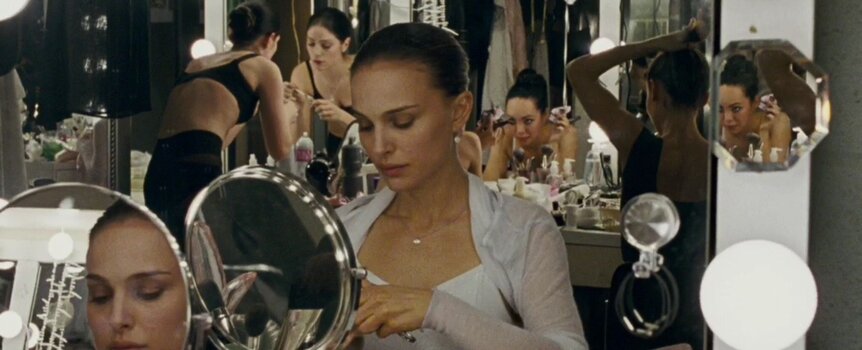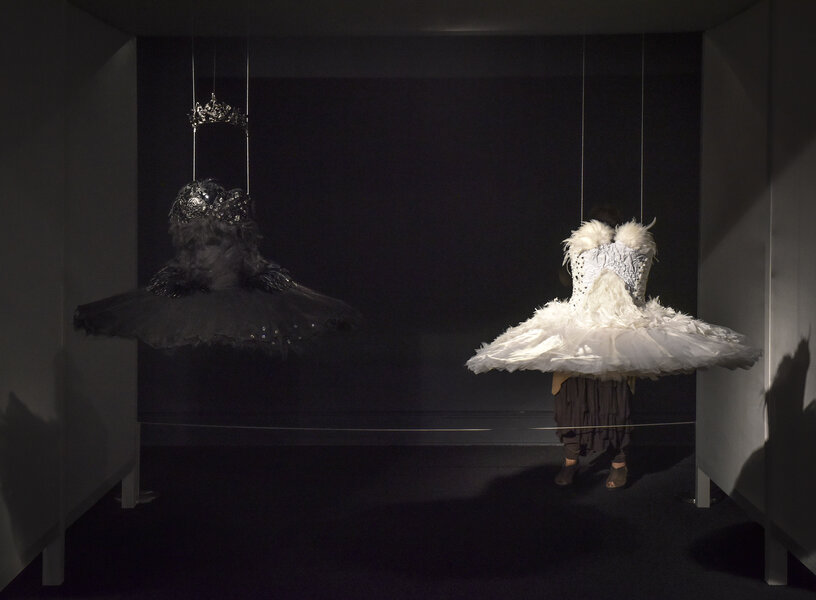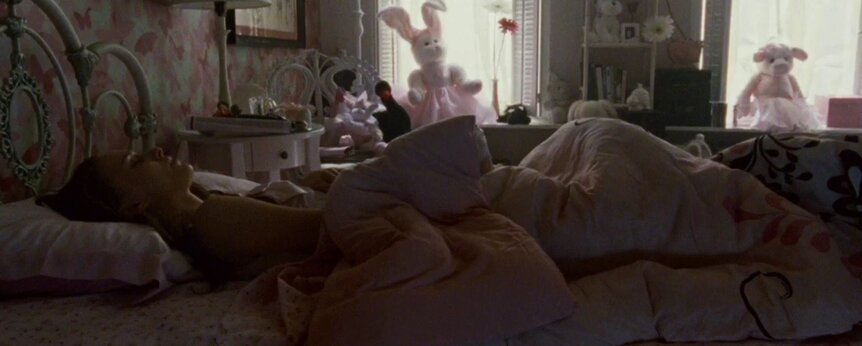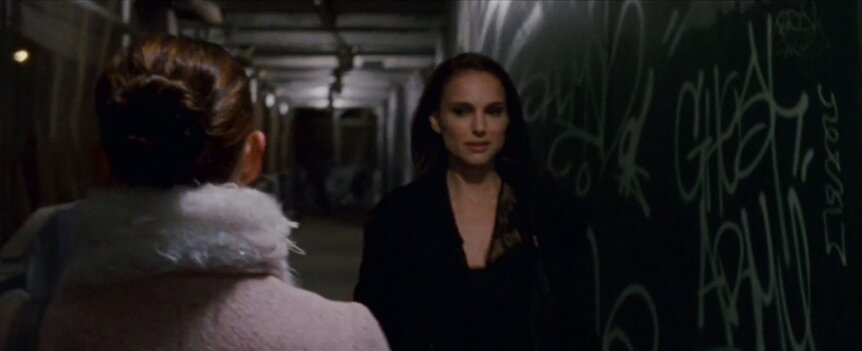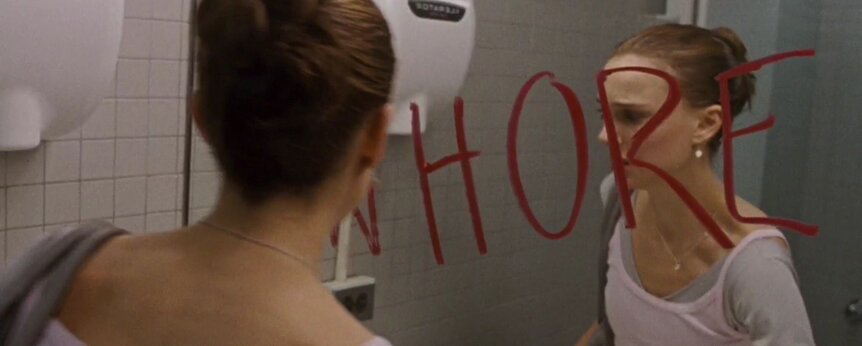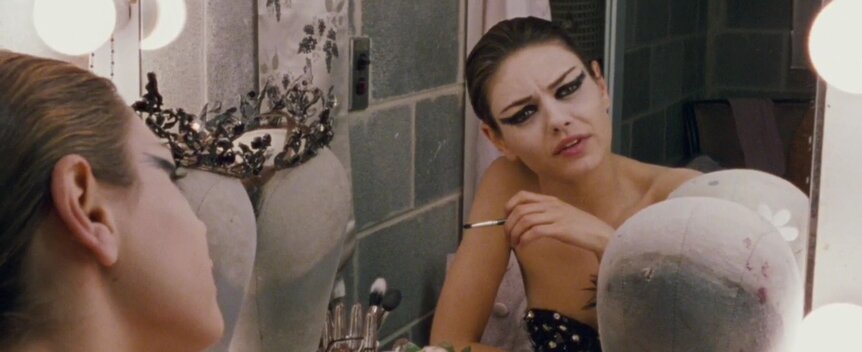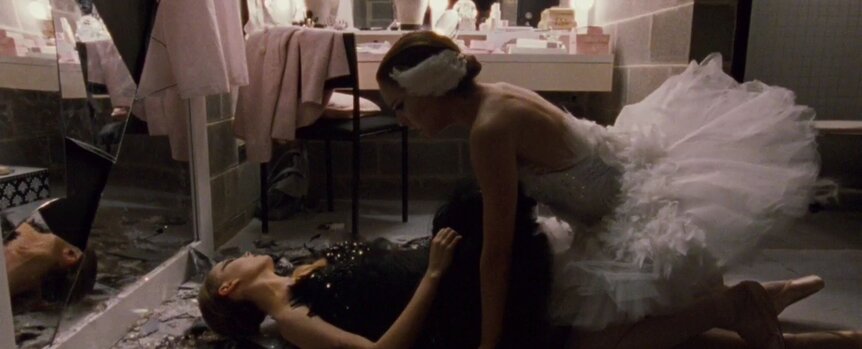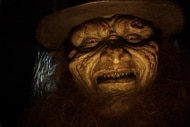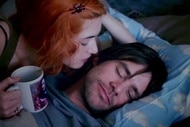Create a free profile to get unlimited access to exclusive videos, sweepstakes, and more!
Black Swan, rivalry, and the horror of aging
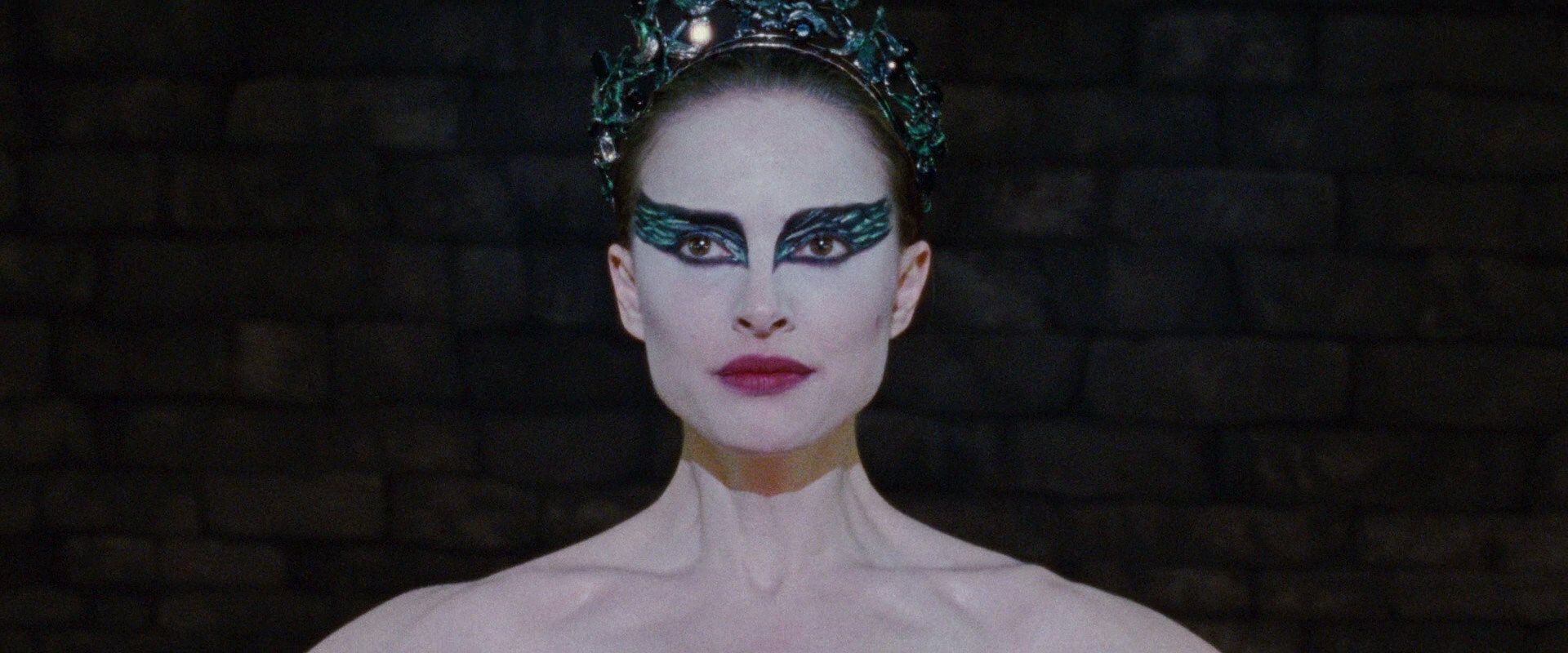
"Magic mirror on the wall, who is the fairest one of all?" This famous utterance is from a different fairy tale to the one Tchaikovsky's Swan Lake is based on, but the use of mirrors in Black Swan is just as vital to the story as the enchanted object in Snow White and the Seven Dwarfs.
Holding up a mirror is an effective way to portray duality, whether revealing someone's true face or showing an image depicting what the rest of the world sees. In Black Swan, frames are filled with reflections on the subway, in a bathroom, inside a dressing room, or in the dance rehearsal space. Mirrors are also often used in horror to increase tension, and Black Swan repeatedly uses this device as a way to create an unsettling visual and as a weapon (both literal and figurative).
Reflective surfaces reveal flaws, particularly if you look long enough at every blemish. In the competitive world of professional ballet, mirrors line the rehearsal space in order to help with performance. Nina Sayers (Natalie Portman) spends a lot of time focusing on her own image in order to become the best, but she isn't the only one offering up critiques on her technique. In a world in which perfection is hard to achieve, it is easy to lose yourself to the pressure.
Nina's dream is to play the lead role in the New York City Company production of Swan Lake. A simplified version of the plot is given by Nina to a guy (played by Sebastian Stan) in a bar, "It's about a girl who gets turned into a swan and she needs love to break the spell, but her prince falls for the wrong girl so she kills herself." Her role as both the White and the Black Swans requires two very different interpretations.
Sleazy company director Thomas Leroy (Vincent Cassel) knows she is more than capable of delivering a flawless depiction of the measured perfection of the White, but the seductive side of the same coin is a challenge. In part, this is because Nina is trapped in an infantilized version of her life. Instead of needing to break the spell of being a swan, she is trapped within the walls of her childhood bedroom.
Pink butterfly wallpaper, no lock on the door, and getting put to bed by her mother with a music box to lull her to sleep are all the signs of someone who is a lot younger. It is also a sign that this is not the first time that pressure to be perfect has impacted her mental health. The lack of a lock and her mother's concern about her scratching are strong indicators that this is far from the first incident of this kind.
Slow dread builds throughout the film, as Nina's quest for perfection causes her to unravel. Steadicam and handheld sequences not only give a front-row seat to the ballet, but they also add to the claustrophobic and frenetic aesthetic. In evoking the heady atmosphere of Rosemary's Baby, director Darren Aronofsky constantly keeps the audience in a state of suspense.
Seeing is believing, but the audience isn't always informed about the veracity of an incident. Danger doesn't come from those Nina thinks are trying to steal her role, but from within. She clocks a figure on the subway at the start of the movie before seeing the same person as she is walking home from rehearsal. Rather than the new dancer who has just joined the company, it is a version of herself dressed in dark colors with her hair down.
Lily (Mila Kunis) is the new addition to the company who turns Nina's world upside down. Her dancing form is less controlled, she ignores no-smoking rules and has an ease that is opposite to Nina's rigidity. In the right circumstances, they could be friends, but in this story, Lily is everything Nina fears. She is younger, more relaxed, and good enough to be her alternate. Kunis also looks enough like Portman in shadow or quick cuts, delivering a disturbing mirror image that haunts Nina through to the dizzying climax.
Nina is an unreliable narrator, which allows Aronofsky to keep the audience guessing when it comes to what is real. Her repeated hangnail and subsequent bleeding is one such technique — it is impossible not to shudder when thinking about these scenes. Each time Nina sees the blood pooling and she begins to pull, it is revealed there is nothing there, whereas the scratch marks on her back are very real. After it's announced that Nina has been cast as the lead, someone scrawls the word "WHORE" in lipstick on the bathroom mirror. It isn't clear if it is real or if Nina was the one who did it — the latter is more likely.
When she returns the things she took from Beth's (Winona Ryder) dressing room, the shoe knife becomes a weapon of self-harm, as Beth repeatedly stabs herself in the face. Again, there is no confirmation whether this is imagined or actually happened but the theory that it is part of Nina's psychosis certainly adds up.
Beth represents the Ghost of Christmas Past, a drunken vision of what happens when you are considered too old to perform. At the start of the film, Nina defends Beth when others in the company make bitchy remarks about how she is nearing menopause. However, when Beth accuses Nina of using her body to get this role, she meekly retorts that not everyone has to resort to that. Thomas calls his former lead his "Little Princess," which is not only creepy but also reduces her to that aforementioned childlike image. She is no longer the fairest one of all, which is why she smashes the mirror in her dressing room before she departs.
It also explains why Nina sees Beth stabbing her face repeatedly in a moment of self-mutilation, even if it didn't happen. "I was just trying to be perfect like you," Nina tells the woman she has replaced. "Perfect? I'm not perfect. I'm nothing," Beth responds with a bleak indictment of a career that takes everything, before being tossed aside for the new shiny version.
At dinner with Lily — after Nina has defied her mother in a very 'teenager stomps out of the house' demonstration — she tells her frenemy of the "Little Princess" moniker, which Lily correctly thinks is "so gross." As they hang out, it becomes clear that Lily is deep in "Cool Girl" territory — she has a spare sexy top in her bag, her dinner is an extra bloody burger, and she doesn't have any qualms about getting wasted the night before a big day at work. Because we are seeing Lily through Nina's eyes, it is hard to know whether this is an exaggerated version; in reality, she doesn't appear to be doing anything out of malice.
When Nina confronts her about their supposed romantic hook-up the night before, Lily has no idea what she is talking about, but jokingly asks "Was I good?"
Sex plays an important function in Nina's mental state because, like pretty much everyone else, she is pretty repressed in this department. She is not a virgin, but she doesn't have much privacy to complete the masturbation homework assignment Thomas has set her. The first time she tries, she rolls over to see her mom asleep on a chair in her bedroom. It is a shocking moment that leaves the viewer just as horrified as Nina at this intrusion of her privacy. Later, when she starts to explore while in the bathtub, she can't get into it and slides under the surface. Blood drips into the water and she opens her eyes to see her doppelgänger standing menacingly above her. When she finally loses herself in a moment of passionate release, she believes she is hooking up with Lily, but her rival's face morphs into her own. Instead of elation the following morning, she wakes up late and misses the start of rehearsal with Lily taking her place on this occasion. It isn't part of some grand scheme, the only sabotage here is self-inflicted.
The final act sees Nina having to escape the pink bedroom prison with her mom as the gatekeeper. Erica Sayers (Barbara Hershey) is a cautionary tale, a version of the path not traveled as she gave up her dreams of being a dancer when she had Nina. By the time Nina gets past her mother, Lily is already in costume as the Swan Queen because Erica had called in sick for her daughter, another act of manipulation.
Nina's big moment is here, but her confidence takes a crushing blow when she is distracted during her turn as the White Swan and the Prince drops her. This is the part of the routine she is meant to excel at. Perfection has always been her driving force, so this is a devastating blow. When she returns to her dressing room, Lily taunts her. She is already wearing the Black Swan costume and a fight ensues, resulting in another smashed mirror. Nina plunges a shard in her rival, but as the next act is about to start she can't do much to dispose of the body other than hiding it in the bathroom.
What follows is the best Nina has ever been in a transformative moment — but when she returns to her dressing room, shards of glass litter the floor, blood is pooling from underneath the door. The spell is broken when Lily stops by to congratulate her on the transcendent performance. She opens the bathroom door to see an empty room, and when she looks down at her body she is the one with glass buried in her stomach.
But the show must go on and Nina is not going to let her crowning achievement slip through her fingers, particularly after she embodied the passionate Black Swan with such conviction. After successfully completing the "death scene," everyone gathers to congratulate Nina, but the small amount of blood has spread and is visible to all. This is not a hallucination, but she is no longer concerned. She has achieved her dream; like the swan of the story she is freed in death. But this is not a fairy tale, and Nina is not a Snow White who gets to live happily ever after.
